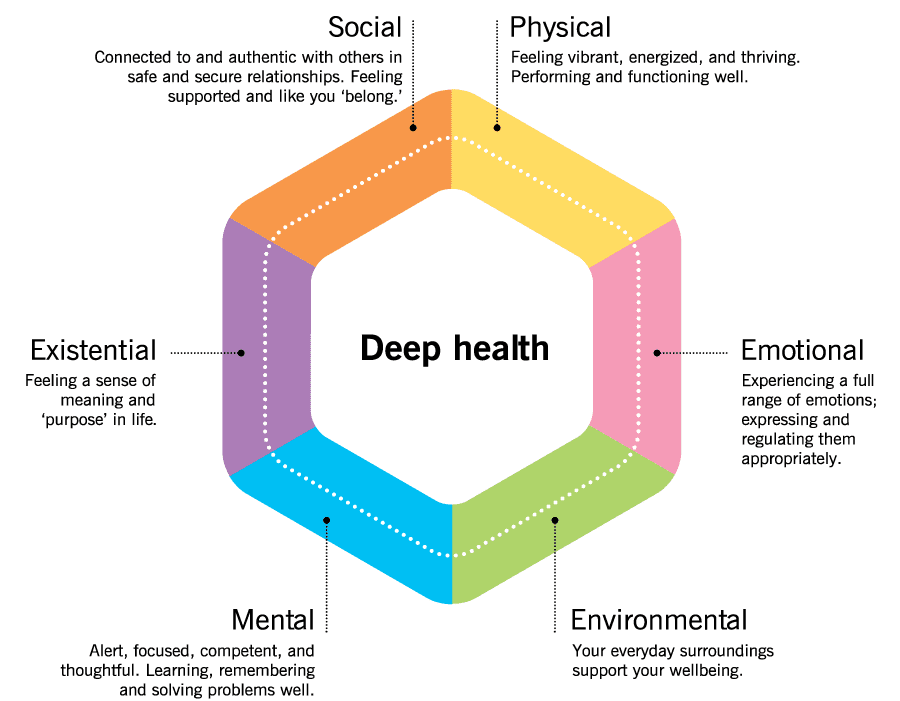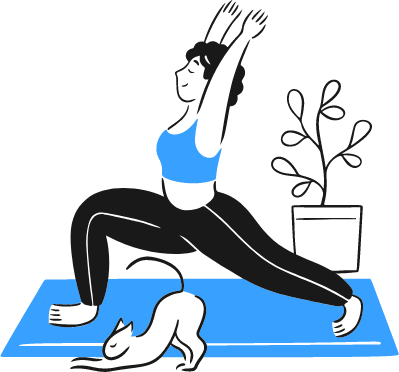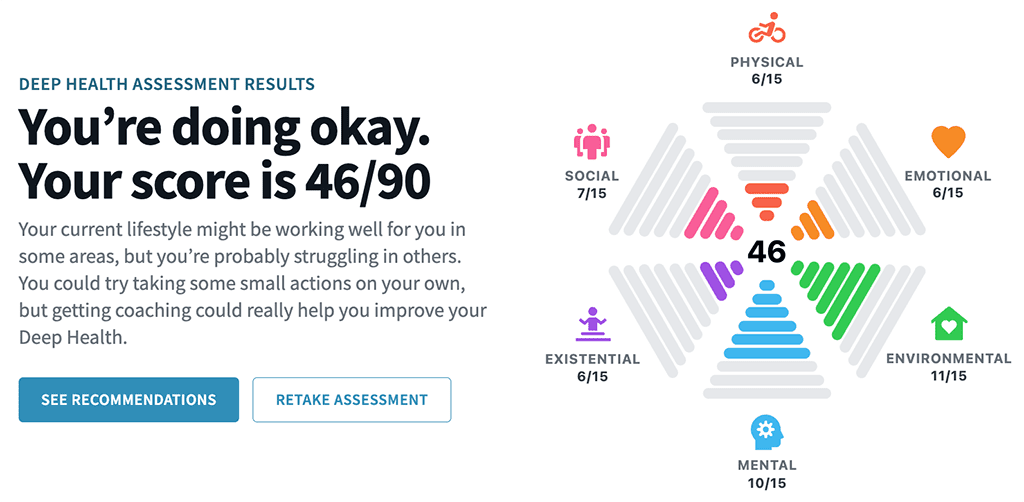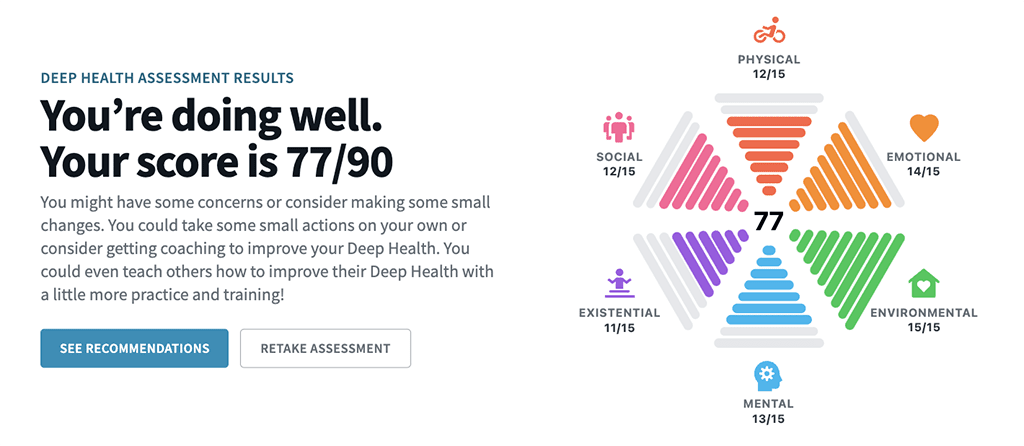There’s been a growing shift in the fitness, health, and wellness industry.
The promise of “immediate results” will probably never lose its sparkle.
But, as a good portion of our population (hi, Boomers!) moves into their “silver” years, conversations around optimizing lifespan (how long you live) and healthspan (how long you live with a high quality of life) are also on the rise.
People are more interested than ever in longevity, which, these days, means the combination of a long lifespan and a long healthspan. (Historically, longevity and lifespan were synonymous.)
Trending too is the concept of biological age—essentially, how “old” your cells are, determined by their health and functioning. (Compare this to chronological age, which just refers to how many years you’ve been on this planet.)
Increasingly, people want to improve their overall health—for the long haul.
Of course, the wellness market is responding to this trend with supplements, ultra-specific diet plans, I.V. therapy, cold plunges, and other fringe modalities that promise to reduce or slow biological aging.
While some of these therapies are questionable, the movement that inspired them is great; For many of us in the health and fitness industry, the shift toward holistic health and long-term wellbeing is a welcome one.
At PN, we’ve held and promoted this expanded view of health for a while now.
We call it Deep Health
Deep Health is a “whole-person, whole-life” phenomenon that involves thriving in all dimensions of the human experience.
This framework of health includes six interdependent dimensions that influence and interact with each other.

These six dimensions are:
✅ Physical health
The one we all know best, and what people have historically thought of when thinking about health.
This is how your body feels, functions, and performs.
We measure physical health with blood work—such as your cholesterol and hormone levels and your blood pressure—as well as performance metrics like V02 max and demonstrations of strength, and subjective measures like energy and pain levels.
✅ Emotional health
This is about feeling a full range of emotions, but having more positive than negative feelings.
You can recognize, regulate, and appropriately express your emotions directly, maturely, and honestly. You have the resilience to recover from strong emotions, and calm yourself when you become stressed, anxious, or upset.
✅ Environmental health
This is about being and feeling safe and secure, as well as being and feeling supported by your everyday surroundings.
You have access to resources (health care, healthy food, clean air and water, nature) that support your goals and wellbeing.
✅ Mental or cognitive health
This is related to how well you think, learn, remember, and creatively problem-solve.
Your mind is sharp, and you’re able to be your most productive and do your best thinking.
This dimension also includes your mindset, capacity for insight, and your perspective and outlook on the world.
✅ Existential or purposeful health
Some might think of this as spiritual or soul health.
You have a deeper “why” or purpose for your life; you feel part of a “bigger picture.”
You have a strong sense of yourself and your intrinsic self-worth. You work to fulfill your purpose by choosing behaviors that align with your identity and values.
✅ Social or relational health
This is about connecting and interacting well with others.
You develop and maintain authentic, fulfilling relationships. You have a sense of belonging, and you feel respected, “seen,” valued, and supported by others.
If you have Deep Health, it’s almost a guarantee…
You’re experiencing a life well-lived. A vibrant, thriving life that’s healthy in every sense of the word.
Not surprisingly, such a life is also statistically more likely to last longer, with more of those years being enjoyable.
(For more on Deep Health, plus how you can use the concept to transform your own—or your clients’—health, read: The “Deep Health” coaching secret)
High-impact habits to boost Deep Health (and by extension healthspan, longevity, and biological age)
While there are many things that can impact healthspan, longevity, and biological age, the following will give you the best return on investment.
These aren’t always the “sexiest” actions, nor are they likely to sound “cutting edge” (partly because they’ve been tested by time and robustly proven by decades of research).
But—if you’re looking to maximize Deep Health for as long as possible—they’re the things worth spending your time on.
The most important thing is being active.
If there’s a “magical panacea” out there, it’s exercise.
Before you start beating yourself up for not being “a gym person”…
…Any activity helps…
…At any dose.
Whether you clean your yard, vacuum, play games with your pets or kids, or just do a little walking, tell yourself, “I’m doing great!”
Because you are. These activities make a positive, measurable difference.
If you want to level up, get in a mix of aerobic or cardiovascular exercise, strength training, and stability work (like yoga, tai chi, or balance-challenging exercises).
Again, these can be in whatever amounts you can, in ways you enjoy.
For quintuple stars, aim for at least 150 minutes per week of moderate aerobic exercise (or 75 minutes of intense aerobic exercise), plus two or more strength and stability training sessions per week. (If you do these activities with friends—bonus!—now you’re boosting social health too.)
In general, the more activity the better. (So long as you enjoy it—and your body is recovering adequately.)
A thoughtful diet—and a mindful approach to other substances—is big, too.
Rather than focus on food you “shouldn’t be eating,” center your attention on the abundance of foods that serve your health and wellbeing.
We’re talking:
- Lean proteins (which can come from animals and/or plants, like fish, chicken, tofu, eggs, tempeh, Greek yogurt)
- A rainbow of fruits and vegetables (fact: different colors provide different nutrients and benefits, so aim to eat all of the colors regularly)
- Minimally-processed carbohydrates (whole grains, beans and lentils, starchy tubers like potatoes and sweet potatoes, and winter squash)
- Healthy fats (from nuts, seeds, avocados, extra virgin olive oil, nut butters, and a little dark chocolate)
For help choosing higher-quality versions and a wide variety of the above categories, check out one of our most popular infographics: ‘What should I eat?!’ Our 3-step guide for choosing the best foods for your body
To stay hydrated, drink plenty of water. For variety, emphasize mostly zero-calorie drinks like unsweetened tea and coffee. (If you’re confused about how much fluid to drink every day, you’ll love the “pee chart” in this article: ‘How much water should I drink?’)
Avoid smoking or chewing tobacco, and if you drink alcohol, do so lightly to moderately.
And of course, getting quality sleep and regulating stress makes everything better.
Get enough quality sleep by prioritizing and protecting the time you rest.
Make your sleeping area as comfortable, quiet, and dark as possible. Figure out when you need to get to bed to get seven to eight hours of sleep, and ideally, start winding down with a relaxing bedtime ritual about half an hour to an hour before that time.
(Want to learn more about why sleep is so important—and how to get more of it? Check out our infographic: The power of sleep)
To build your emotional resilience and stress tolerance, incorporate soothing, self-regulating activities daily.
These activities are somewhat subjective (some people find it relaxing to sit and meditate, while others find it to be an opportunity for restless anxiety to boil over). However, “crowd favorites” include: breathing exercises, time in nature, various forms of self-expression (journaling, art, movement), or just a good soak in the tub.
One of the most important mindsets to adopt to help your mental and emotional health—although it can benefit all areas of life—is a growth mindset.
People with a growth mindset tend to view challenges and adversity as opportunities to grow, evolve, and learn. And turns out, this kind of perspective isn’t just good for your mental and emotional health, it boosts longevity, too.
Research shows that, compared to less optimistic individuals, those with a more positive attitude and a growth mindset about aging had a 43 percent lower risk of dying from any cause, and lived about 7.5 years longer.1 2
Lastly, don’t underestimate the power of finding your people—and a purpose.
Seeking and nurturing positive, supportive relationships is one of the best things you can do for your health.
And not just for your social health. Research shows that people who are satisfied with their relationships have better emotional health,3 cognitive health,4 and even physical health.5
In fact, one of the longest studies on human health—the Harvard Study of Adult Development, which tracked participants for nearly 80 years—showed that feeling happy and satisfied in one’s relationships was one of the best predictors of overall health, happiness, and longevity.6
(Feel like your social health could use a boost? We’ve got three strategies to improve connection in your life, right here: Is social health the secret to total-body health?)
Having a strong sense of purpose bolsters our health and longevity too.7 8
Interestingly, a sense of purpose seems to help people live longer, even when controlling for other markers of psychological well-being. So there’s something uniquely beneficial about having a strong purpose that’s different from, say, being happy.
A purpose can take time to uncover, but you can facilitate that discovery by devoting regular time to the “big questions” in life:
- Who are you, really?
- What do you want your life to be about?
- How do you want to live?
- More practically: What gets you out of bed in the morning? (Is it your family, or showing up for your clients? Or something else?)
But Deep Health isn’t just something you want to achieve—it also serves as a framework to help you make choices.
When you understand how Deep Health works, it can also help you answer the often vague and perplexing question, “How can I feel better?”
Knowing about your own Deep Health can tell you which area of your life to prioritize right now that will make the biggest impact on your overall health.
How to use Deep Health to help you prioritize next actions.
Start by assessing your current Deep Health to get a baseline status. Click on the image below to access your own free assessment.


Deep Health Assessment
How’s your health… REALLY? Let’s find out.
© Precision Nutrition
Depending on what’s going on in your life right now, you might get a Deep Health score that looks like this:
Or like this:





